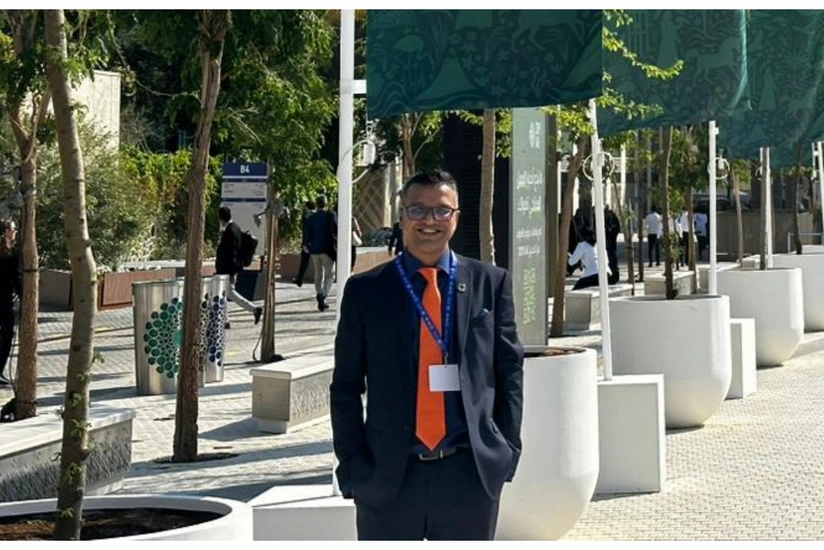Head of Center for Sustainability and Climate: COP29 to become excellent platform for discussion
- 23 February, 2024
- 11:09

The Conference of the Parties to the UN Framework Convention on Climate Change (COP29) will be held this year in Azerbaijan. The decision to hold COP29 was made at the COP28 plenary meeting in Dubai last December. The holding of COP29 can be considered one of the most significant events of 2024 for Azerbaijan, as well as a continuation of the country’s transition strategy to a green economy, in connection with which Azerbaijani President Ilham Aliyev signed a decree declaring 2024 in Azerbaijan the “Green World Solidarity Year.”
On February 22, Report, as part of the information support for this important event for Azerbaijan, signed a memorandum of cooperation with the Prince Sultan University Center for Sustainability and Climate (CSC) (Saudi Arabia).
In an interview with Report, the head of CSC, Academic Visitor (Senior Member) of St Antony’s College, University of Oxford, UK, Professor Mohammad Nurunnabi spoke about how Saudi Arabia and Azerbaijan can cooperate in the fight against climate change, his expectations from COP29 and the impact of the “green transition” on the creation of new workplaces, etc.
-How would you comment on the outcome of COP28 held in Dubai, and what are your expectations for COP29 will be held in Baku?
-Well, COP28 in Dubai, UAE attracted over 97,000 people including 2,456 fossil-fuel lobbyists who out-numbered nearly all individual country delegations. At the UN Climate Summit, COP28, the outcome was the urgency of addressing the climate crisis is more apparent than ever. The commitment is included in the first “global stocktake” of how countries can accelerate action to meet the goals of the landmark Paris Agreement. It is the first time such an agreement has been reached in 28 years of international climate negotiations. The significant pledges were loss and damage to renewables. On the first day of the COP28 UAE, hundreds of millions of dollars were pledged for the Loss & Damage Fund. The UAE opened the pledges with $100 million, closely followed and matched by Germany. By the end of COP28, the Fund totaled $770.6 million.
The US pledged just $17.5 million, while the UK and Canada were accused of simply re-pledged money they had already committed. The UK with $40 million for the fund and a further £20 million for related spending. As many as 130 countries signed a deal to triple production of renewable energy and double energy efficiency. Led by EU president Ursula von der Leyen, the plan is to generate 11TW by 2030. The final agreement to “transition” away from fossil fuels is not a resounding win for justice either. By leaving room for the continued expansion of fossil fuels, the agreement will likely prolong and deepen the risks to the most economically and environmentally vulnerable communities.
My expectations for COP29 in Baku are that Azerbaijan will be a great platform for pushing developed countries to commit more funding on climate commitments and also making sure that countries prepare ambitious new national climate plans to build on the agreement. I would like to see more efforts to get fair financing for climate action.

-In your opinion, how Azerbaijan and Saudi Arabia can cooperate in the framework of COP29?
-There are ample opportunities. As you know, the Saudi Green Initiative (SGI) launched in 2021 an ambitious national initiative for the Kingdom of Saudi Arabia that aims to combat climate change, improve quality of life, and protect the planet for future generations. The Saudi Green Initiative is a national initiative under the patronage of His Royal Highness Mohammed bin Salman, Crown Prince and Prime Minister.
Saudi Arabia plays a key role in achieving global climate targets as the key part of Saudi Vision 2030 and UN SDG. Through whole-of-society action and investment, the Saudi Green Initiative is paving the way towards a greener tomorrow. SGI activates all engines of society to deliver against three overarching targets - emissions reduction, afforestation, and land and sea protection. At present, 77 initiatives are being implemented, all representing a huge investment in the green economy. Since SGI’s inauguration in 2021, the Kingdom’s global commitments have been turned into tangible action and Saudi’s climate action ambitions are on track. The first wave of more than 60 initiatives announced in 2021 represented over SAR 700 billion ($186 billion) of investments, contributing to the growth of the green economy. In 2022, 17 new environment-focused initiatives were launched. More initiatives will launch in the coming years, scaling up Saudi Arabia’s ambition to create a green future.
So, Azerbaijan could see the initiatives of the Saudi Green Initiative and can work on some of the initiatives jointly to help each other to address the need for climate impacts.
We at Prince Sultan University’s Center for Sustainability and Climate (CSC), the first think tank on sustainability and climate in Saudi Arabia are strongly committed to the United Nations Sustainable Development Goals (SDGs) through effective institutional resources management, innovative teaching and learning, research, national and international partnerships, continuous studies, and outreach. Our mission is to support Saudi Arabia’s Vision 2030 and the PSU’s strategic directions. The Center for Sustainability and Climate (CSC) transforms commitments into action and builds a decarbonized, more sustainable world, driving technological and economic transformations to realize sustainable competitive advantage. So, there is an opportunity for Azerbaijan to cooperate with educational institutions for research on sustainability, environment and climate and policy recommendations.
-What could you say about the impact of the green transition on job creation and economic development?
-According to the World Economic Forum 2024, along with the implementation of generative AI, the transition to green will be the next great labor market revolution. “Many people are optimistic about their role in this green future, but many are not. As employers, we need to continue to bring people along during times of momentous change – showing workers what the future will look like, guiding them to upskill and reskill, and ensuring green jobs are attractive to all generations and collars.” The ManpowerGroup Global Insights 2024 (Building Competitive Advantage with A People-First Green Business Transformation) study explores the impact of the green transition on the future of work for employers and workers. There are ample opportunities for a larger portion of the workforce to participate in the green economy around the world will grow. By 2030, the green transition is expected to create up to 30 million new jobs. However, this green transition is happening during a time of growing talent scarcity. ManpowerGroup surveyed nearly 39,000 employers in 41 countries to learn how actively they were recruiting for green jobs and skills. Three-quarters of employers globally (75%) say they are struggling to find the skilled talent they need. An even larger majority (94%) say they do not have the skilled talent to achieve their Environmental, Social and Governance (ESG) goals.
-What do you think developed countries should do to combat climate change?
-The US, China, Russia, Brazil, Indonesia, Germany, India, the UK, Japan, Canada, France, Australia, Argentina, Mexico, South Africa, Italy, South Korea, Saudi Arabia, the European Union and Türkiye as the G20 – together responsible for 80% of the world’s emissions in 2025 – will have seriously re-engineered their targets on this basis. As you are aware the loss and damage fund provides a reparative mechanism for industrial powers to transfer disaster recovery aid to developing nations. This was a 28-year hard-won acknowledgment that those responsible for the most emissions should cover the damages. However, the fund has garnered only $429 million, well below the damages in developing countries that are estimated at $400 billion annually, with no commitment made to increase levels of funding. The US contribution of $17.5 million is paltry considering the United States is the largest contributor to cumulative greenhouse gas emissions. So, I think that more commitment and more actions are needed from the developed countries, and not only talk, actions are needed urgently!
-How could you comment on the role of business in coping with climate change?
-There are many regulations and guidelines globally on Environmental, social and corporate governance (ESG). Corporate actions on sustainability and climate are already driving significant change internationally, and accelerating this action will enable the policy, technological, behavioral, and business model changes needed for a zero-carbon society. However, the reality check is that many businesses are globally looking for information and a better understanding of the climate change impact on their business. Well, there is a misconnection that the actions for climate change for the business community are investments without any return. A recent study (Impact of ESG performance on firm value and profitability) was based on the largest 5000 publicly listed firms in the world from the Bloomberg database spanning 9 years from 2013 to 2021 and Refinitiv ESG score and panel data entails 14043 firm-year observations.
The study reveals that ESG performance has a positive and highly significant relationship with firm value and profitability. These findings provide evidence for corporate managers to justify mobilizing more resources for ESG. Discussing the Has ESG Affected Stock Performance? Morgan Stanley Capital International (MSCI) finds that High-- ESG-rated companies are more competitive and can generate abnormal returns, leading to higher profitability and dividend payments. High ESG-rated companies are better at managing company-specific business and operational risks and therefore have a lower probability of suffering incidents that can impact their share price.
